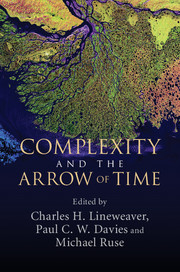Book contents
- Frontmatter
- Contents
- Author biographies
- Part I Introduction
- Part II Cosmological and physical perspectives
- Part III Biological complexity, evolution, and information
- Part IV Philosophical perspectives
- 12 Wrestling with biological complexity: from Darwin to Dawkins
- 13 The role of generative entrenchment and robustness in the evolution of complexity
- 14 On the plurality of complexity- producing mechanisms
- Index
- References
12 - Wrestling with biological complexity: from Darwin to Dawkins
from Part IV - Philosophical perspectives
Published online by Cambridge University Press: 05 July 2013
- Frontmatter
- Contents
- Author biographies
- Part I Introduction
- Part II Cosmological and physical perspectives
- Part III Biological complexity, evolution, and information
- Part IV Philosophical perspectives
- 12 Wrestling with biological complexity: from Darwin to Dawkins
- 13 The role of generative entrenchment and robustness in the evolution of complexity
- 14 On the plurality of complexity- producing mechanisms
- Index
- References
Summary
The inhabitants of each successive period in the world's history have beaten their predecessors in the race for life, and are, in so far, higher in the scale of nature; and this may account for that vague yet ill-defined sentiment, felt by many palæontologists, that organisation on the whole has progressed.
(Darwin, 1859, 345)I have long been rather dubious about the notion of complexity. Certainly, it is not something that is always desirable. For instance, in theology, as is well known, a central Christian claim is that God is the ultimate simple. In mathematics, simplicity and elegance are highly valued. One thinks for example of the Euler identity: eiπ + 1 = 0. And in science too, there is much to be said for simplicity. Charles Darwin's supporter Thomas Henry Huxley, on being informed about natural selection, is supposed to have exclaimed: “How simple, how stupid not to have thought of that!” More generally in science, the ultimate in scientific achievement is bringing disparate parts of enquiry together under the same hypothesis. This process, known as a “consilience of inductions”, is the paradigmatic exercise in producing simplicity (Whewell, 1840).
However, there is no doubt that the notion of complexity (and related notions of progress) continue to fascinate and absorb our attention. In this discussion, I would like to offer a few remarks about complexity (and progress) as they play out in evolutionary biology. To anticipate, it has long been recognized by historians of evolutionary biology that in the middle of the nineteenth century in Britain there were two competing views of the evolutionary process (Richards, 1987; Ruse, 2013a). One was expressed by Charles Darwin in his Origin of Species (1859), the other by Herbert Spencer in a series of writings, culminating in the 1860s with his First Principles (1862) and his Principles of Biology (1864).
Information
- Type
- Chapter
- Information
- Complexity and the Arrow of Time , pp. 279 - 307Publisher: Cambridge University PressPrint publication year: 2013
References
Accessibility standard: Unknown
Why this information is here
This section outlines the accessibility features of this content - including support for screen readers, full keyboard navigation and high-contrast display options. This may not be relevant for you.Accessibility Information
- 3
- Cited by
